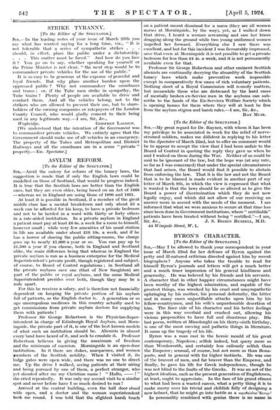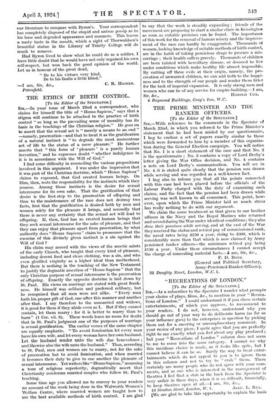BYRON'S CHARACTER.
[To the Editor of the SPECTATOR.] SIR,—May I be allowed to thank your correspondent in your issue of March 22nd for her defence of Byron against the petty and ill-natured criticism directed against him by recent biographers ? Anyone who takes the trouble to read for himself Byron's journals and letters will get a much better and a much truer impression of his general kindliness and generosity. He was beloved by his friends and his servants. A character that in other happier circumstances might have been worthy of the highest admiration, and capable of the greatest things, was wrecked by his cruel and unsympathetic upbringing by his mother, his personal deformity, the bitter and in many cases unjustifiable attacks upon him by his fellow-countrymen, and his wife's unpardonable desertion of him. The finer side of his character and his better feelings were in this way overlaid and crushed out, allowing his vicious propensities to have full and disastrous play. His last poem, written at Missolonghi on his thirty-sixth birthday, is one of the most moving and pathetic things in literature. It sums up the tragedy of his. life.
Byron was a man cast in the heroic mould of his great contemporary, Napoleon ; selfish indeed, but query more so than Wordsworth, and certainly less callously selfish than the Emperor; sensual, of course, but not more so than Bona- parte, and in general with far higher instincts. He was one of the bravest of men, and far braver than the Emperor, and finally, he gave his life for Greek independence, though he was not blind to the faults of the Greeks. It was an act of the highest idealism, such as the present generation of Englishmen, at least, ought to appreciate. In the face of his grand climax to what had been a wasted career, what a petty thing it is to make merry over his trivial and childish folly of designing a new helmet, that he might go into battle as a KoputlafoXos'Eicrcup I In personality combined with genius there is no name in
our literature to compare with Byron's. Your correspondent has completely disposed of the stupid and untrue gossip as to his base and degraded appearance and manners. This leaves a nasty taste in the mouth, which a sight of Thorwaldsen's beautiful statue. in the Library of Trinity College will do much to remove.
Had Byron lived to show what he could do as a soldier, I have little doubt that he would have not only regained his own self-respect, but won back the good opinion of the world. Let us in honour of the great dead, " Be to his virtues very kind, Be to his faults a little blind."
Petersfield.



























































 Previous page
Previous page